Persepolis by Marjane Satrapi
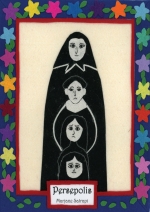
This autobiographical graphic novel about coming of age in Tehran during the Islamic Revolution was pulled from Chicago schools for "graphic language and images that are not appropriate for general use in the seventh grade curriculum." At present, it can only be taught in Chicago high schools by teachers with special training.
I made this collage in felt to show Marjane as she grows up in 1980s war-ridden Iran. The center, in black and white, depicts the graphic novel. The frame is inspired by Persian textiles to highlight her rich cultural heritage.
The Awakening by Kate Chopin
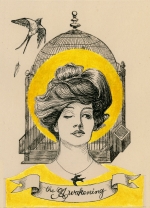
Chopin's story of self-discovery and suicide challenged the gender roles of Victorian society, leading to criticism that the story was "morbid," "feeble," and "vulgar.” Evanston, IL banned it in 1902. Despite disdain for the topic, Chopin’s writing prowess earned praise.
My Edna is modeled after the Gibson girls, illustrated personifications of a feminine ideal. One closed eye symbolizes her incomplete awakening; the birdcage represents lack of freedom and isolation; the halo, Edna’s martyrdom and an homage to the backdrop of Catholicism in French Creole New Orleans.
The Giver by Lois Lowry
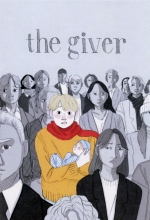
From 1990 -1999, more than 11,000 separate attempts were made to remove The Giver from schools and libraries, most often claiming it’s not suitable for grades 5-8. Ironically, in The Giver, strict rules forbid citizens from reading books other than the dictionary and The Book of Rules.
In the scene depicted, Jonas carries Gabriel as he runs away from the community. Although there is no crowd present in the book, I chose to add the crowd so I can show the juxtaposition of the black and white lives of the citizens, and the colors Jonas sees.
The Librarian of Basra by Jeanette Winter
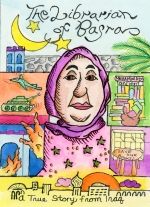
Alia Muhammad Baker saved part of the Basra library’s collection before the building was burned as British forces entered the city during the 2003 Iraq War. Coalitions of parents in FL and NY claimed the book promotes Islam and is too violent for kids.
A courageous librarian along with her friends and neighbors saved 30,000 books. In recognition, I illustrated seven important scenes: Basra itself, the library, the librarian, the coming war, books moving to a safe place, invasion, and fire destroying the library.
The Hate U Give by Angie Thomas
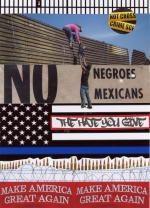
In 2017, after school officials in Katy, TX pulled the book from shelves for “pervasive vulgarity and racially insensitive language,” a teen in the district collected 4,000 signatures on a petition to bring it back. Students are now required to get parental permission to check it out.
This is a graphic commentary on incarceration, border crossings, racism, the thin blue line of civil unrest, and gun violence. I’m struck by how easily we find offense in fiction, but are not outraged by government complicity in unjust, hateful, and inhumane conditions in our own country.
Charlotte's Web E.B. White
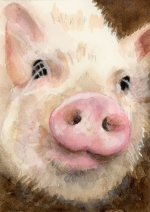
This classic kids’ book won a Newbery Honor and has sold more than 45 million copies since its publication, yet in 2006 the book was challenged by parents in Kansas because “showing [animals] with human abilities is sacriligeous and disrespectful to God.”
Charlotte’s Web is about love, compassion, friendship, and the desire of all creatures to live out their natural lives. I chose to paint Wilbur, the “Pig Who Must Be Saved,” using the sweet, mirthful, insistent face of a little pig who is living in safety at a local farm sanctuary.